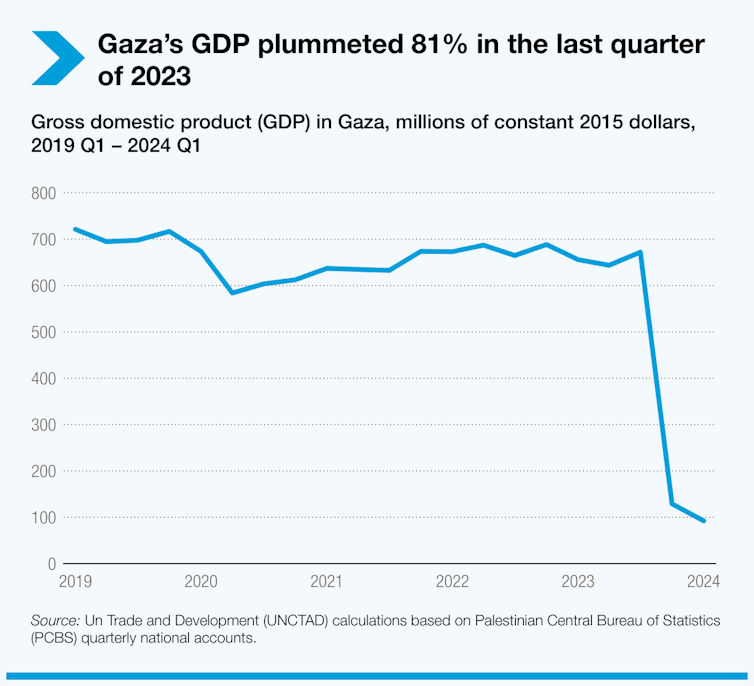The Palestinian economy has been devastated beyond recognition. Israel’s intense military operations in Gaza have led to unprecedented destruction, wiping out much of the enclave’s essential infrastructure, private property and agricultural resources.
Meanwhile, the occupied West Bank is also under severe strain. Similar patterns of destruction, alongside rising settler violence, land confiscations and expanding settlements, have left its economy buckling under the pressure of mounting public debt, unemployment and poverty.
Gaza’s economy was being suffocated even before the war. A blockade imposed by Israel in 2007 has severely restricted the import and export of goods, while fishermen were limited to a six-mile zone, crippling their ability to earn a livelihood.
The blockade caused Gaza’s GDP per capita (a measure of the wealth of a country) to shrink by 27% between 2006 and 2022, with unemployment rising to 45.3%. This gave rise to a situation where 80% of the population depended on international aid.
In addition to the economic blockade, Gaza suffered massive physical destruction due to Israeli military operations in 2008–2009, 2012, 2014, 2021 and 2022. Yet the cumulative effects of 16 years of blockade and military attacks are minor compared to the sheer destruction caused by the current war.
A report by the UN’s trade and development wing (Unctad) has revealed that in the space of just eight months, between October 2023 and May 2024, Gaza’s GDP per capita was fell by more than half. The economic situation now is almost certainly worse.
According to the report, which was released in September 2024, Gaza’s GDP dropped by 81% in the final quarter of 2023 alone. The report concluded that the war had left Gaza’s economy in “utter ruin”, warning that even if there was an immediate ceasefire and the 2007–2022 growth trend of 0.4% returns, it will take 350 years just to restore the GDP levels of 2022.

The only sectors still functioning are health and humanitarian services. All other industries, including agriculture, are at a near standstill. The destruction of between 80% and 96% of agricultural assets has led to rampant food insecurity.
The scale of destruction in Gaza is unprecedented in modern times and is happening under the world’s gaze. From October 2023 to January 2024 alone, the total cost of damage reached approximately US$18.5 billion (£14.2 billion) – equivalent to seven times Gaza’s GDP in 2022.
A separate report by the UN Development Programme, which was published in May, predicts that it will take more than 80 years to rebuild just Gaza’s housing stock if it repeats the rate of restructuring seen after Israeli military operations in 2014 and 2021. Merely clearing the debris could take up to 14 years.
The war has displaced almost all of Gaza’s population, and has thrown people into dire poverty. Unemployment surged to 80%, leaving most households without any source of income. And prices of basic commodities have increased by 250%, which is contributing to famine across the Strip.

Anas-Mohammed / Shutterstock
The economic crisis has also extended to the West Bank, where GDP has fallen sharply. Military checkpoints, cement blocks and iron gates at the entrances to Palestinian towns and cities, as well as the denial of work permits for Palestinians in Israeli settlements, have resulted in more than 300,000 job losses since the start of the war.
The Unctad report reveals that the rate of unemployment in the West Bank has tripled to 32% since the start of the conflict, with labour income losses amounting to US$25.5 million. Poverty is rising rapidly.
Israeli forces have also continued to confiscate Palestinian homes and land. Over the past year alone, 24,000 acres of land in the West Bank have been seized, and over 2,000 Palestinians have been displaced.
This devastation has been exacerbated by Israel’s decision to withhold the tax revenue it collects for the Palestinian Authority, which typically accounts for between 60% and 65% of the Palestinian public budget, as well as a significant decline in international aid. Aid to Palestine has dropped drastically over the past decade or so, falling from the equivalent of US$2 billion in 2008 to just US$358 million by 2023.
The Palestinian Authority is facing a massive budget deficit, which is projected to increase by 172% in 2024 compared to the previous year. This financial strain has crippled the Palestinian government’s ability to provide essential services, pay salaries and meet the needs of a population battered by war, displacement and severe poverty.
The road to recovery
For the Palestinian economy to have any chance at recovery, several immediate steps are necessary.
First, international aid should flow into Gaza uninterrupted, and pressure must be applied to ensure that humanitarian aid – particularly food aid – reaches those in need. Data analysis by organisations working in Gaza suggests that Israel is currently blocking 83% of food aid from reaching Gaza.

Anas-Mohammed / Shutterstock
Second, the destruction of homes, schools and infrastructure must cease. However, this seems improbable as Israel continues to pursue its military goal of destroying Hamas – an objective most analysts believe to be unachievable.
And third, the economic restrictions imposed on Gaza and the West Bank must be lifted. Sustainable development – and any prospect for recovery – cannot be achieved without granting the Palestinian people the right to self-determination and sovereignty over their resources.
This would require new peace agreements, an outcome that appears unlikely at present. But without these crucial interventions, the Palestinian economy will be completely devastated and the humanitarian crisis will worsen, making any future recovery within the lifetime of anyone currently living in Gaza virtually impossible to imagine.













